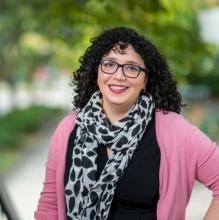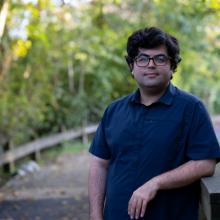My research focuses on identifying existing large-scale solutions to data over-retention. Past surveys suggest that top-tier firms are three times as likely to have active retention programs and to appropriately manage their digital archives and backups, so I am pursuing partnerships with leading companies that also have strong corporate social responsibility programs.
Research Description
The imperative to respond to climate change spans all disciplines, including archival science, the discipline responsible for the long-term preservation of records that hold governments and corporations accountable and that document human rights over time. Retention and disposition refer to the processes whereby organizations determine how long records and information should be kept, and how to manage the long-term preservation and authorized destruction of records following active use. In the digital era, surveys consistently demonstrate that applying retention and disposition and effectively managing large stores of data remains “an elusive reality” for most companies due to three factors: an inability to separate eligible information from that which must be retained; a lack of automated tools; and user resistance. My research focuses on identifying existing large-scale solutions to data over-retention. Past surveys suggest that top-tier firms are three times as likely to have active retention programs and to appropriately manage their digital archives and backups, so I am pursuing partnerships with leading companies that also have strong corporate social responsibility programs. Together, we’ll continue to define the parameters of the over-retention problem while identifying working strategies and solutions within a larger sustainability framework.
What does being a Public Scholar mean to you?
Right now, the world faces daunting problems that governments can’t solve on their own: universities and companies need to work together to develop equitable and sustainable solutions. The Public Scholar Initiative highlights the beneficial partnerships that doctoral students can form with public and private sector entities and reinforces the wider scope and relevance of our joint efforts. Rather than working in isolation, we're part of a movement.
In what ways do you think the PhD experience can be re-imagined with the Public Scholars Initiative?
The Public Scholars Initiative broadens doctoral research by recognizing alternative layers of meaning. For example, my research follows a case study methodology, which in academia is viewed as a form of empirical inquiry around a real-life phenomenon but in business is viewed more as an illustrative example featuring a problem and a solution. Ideally, my research reports and dissertation will not only meet academic requirements but will also be integrated into business activities by the participants and their industries.
How do you envision connecting your PhD work with broader career possibilities?
I view my research as a proof of concept for improved digital storage management practices. In the future, I plan to continue to conduct research in digital environments, write policy, and continue to teach at the graduate level.
How does your research engage with the larger community and social partners?
As a UBC Sustainability Scholar and an On Sustainability Research Network member, I’ve participated in local, national, and international gatherings, sharing my research and learning about climate action from other researchers and activists. I see my work fitting into the larger context of sustainability reporting efforts.
Why did you decide to pursue a graduate degree?
I’ve always loved learning and consider formal education somewhat of an ongoing necessity. After completing my Master’s degree at the University of Toronto in 2003, I spent the next ten-plus years amassing certifications before accepting the fact that I was destined to do doctoral research. My current challenge is staying focused on a single project—there are so many opportunities to pursue in my field!
Why did you choose to come to British Columbia and study at UBC?
As a Vancouverite, I have strong ties to UBC. My parents met here, and there was a year when my sister, brother, and I were all enrolled. Now the race is on to see whether my step-daughter or I graduate first! There are so many things about the university and campus that I love and am involved with, including the Graduate Student Society, the UBC Farm, and the UBC Sustainability Initiative. Of course, there are also UBC’s credentials. The School of Library, Archival and Information Studies is currently the top-ranked iSchool in the world, and my advisor, Dr. Luciana Duranti, is a leading researcher in digital diplomatics and preservation.
Right now, the world faces daunting problems that governments can’t solve on their own: universities and companies need to work together to develop equitable and sustainable solutions. The Public Scholar Initiative highlights the beneficial partnerships that doctoral students can form with public and private sector entities and reinforces the wider scope and relevance of our joint efforts. Rather than working in isolation, we're part of a movement.




